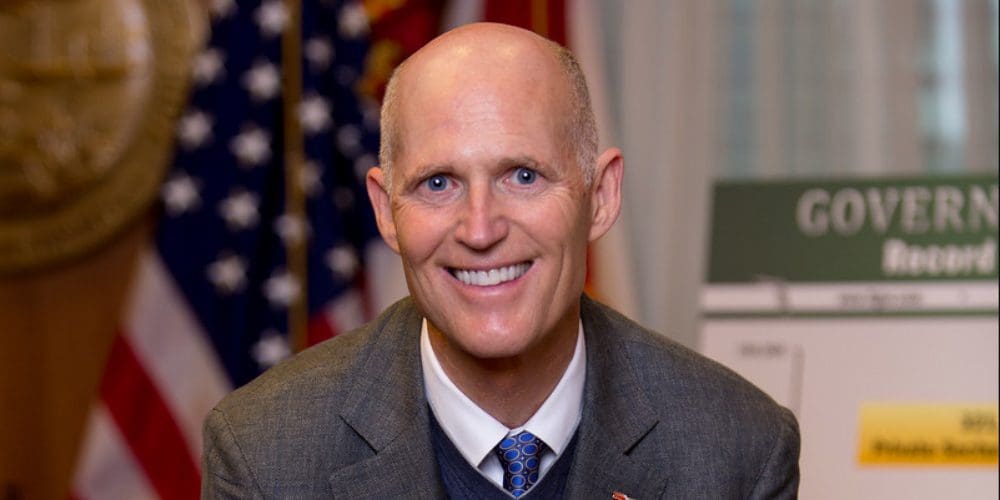Explaining Florida’s New School Safety Law
The Marjory Stoneman Douglas High School Public Safety Act features several broad and controversial reforms.

Florida Governor Rick Scott signed the new Florida school safety law March 9.
A sweeping new Florida law is designed to bolster school safety by funding campus security upgrades and outlining new requirements in areas including emergency preparedness, threat assessment and gun purchasing.
The Marjory Stoneman Douglas High School Public Safety Act was signed by Florida Governor Rick Scott on March 9. Scott described the law as a compromise at the signing but said it will help prevent future school shootings.
“Every student in Florida has a right to learn in a safe environment, and every parent has a right to send their kids to school knowing they will return safely at the end of the day,” Scott said during the signing. “Today I am signing bipartisan legislation that will help us achieve that.”
The law features several broad and controversial reforms that have major implications for the policies and procedures of K-12 schools in the state.
It also tasks the Florida Department of Education with creating the Office of Safe Schools, which will offer guidance with best practices in school security, threat assessments and emergency preparedness, among other things.
Taken as a whole, the Marjory Stoneman Douglas High School Public Safety Act is lot to digest, so Campus Safety broke it down into four major categories below.
Funding for Florida School Safety Provisions
The law requires sworn law enforcement officers to be stationed in every school in the state. The act gives $162 million to schools to help meet that requirement. Every school resource officer is required to undergo crisis intervention training.
The law also designates $99 million for districts to address specific safety needs at their schools. The law specifically mentions that the funding can go toward metal detectors, bulletproof glass, steel doors and upgraded locks.
The state Department of Education and the Office of Safe Schools will provide the grants.
Finally, the law gives $28 million to expand mental health service teams to serve youth with mental illness by providing counseling, crisis management and other services. We outline further enhancements to the state’s mental health system (mainly regarding information sharing) in the threat assessment section below.
Bolstering Threat Assessment Programs, Information Sharing
School boards must establish threat assessment teams at each school to coordinate resources, assess and intervene with people whose behavior may pose a threat to the safety of the school.
When a preliminary determination by the team finds a student poses a threat, the team must immediately alert the superintendent, who then must immediately attempt to notify the student’s parent or legal guardian.
The threat assessment teams should include experts in counseling, instruction, school administration and law enforcement.
The law also aims to improve information sharing in several ways.
For instance, the threat assessment team may obtain a student’s criminal record history if they believe the student could pose a threat.
It also stipulates that all state and local agencies that provide services to students “experiencing or at risk of an emotional disturbance or mental illness” can share confidential information and records if the information is “reasonably necessary to ensure access to appropriate services for the student or to ensure the safety of the student or others.”
In addition, the law stipulates that the Office of Safe Schools will work with the Florida Department of Law Enforcement to create a centralized “data repository” and analytics resources to improve access to information from sources including social media; the Department of Children and Families; the Department of Law Enforcement; the Department of Juvenile Justice; and local law enforcement agencies.
In the event that school staff members suspect a mental heath or substance abuse crisis, they must engage behavioral health crisis resources including mobile crisis teams, school resource officers and the threat assessment team.
Finally, the law established a tool allowing people to anonymously report suspicious activity through a mobile app. The tool has been dubbed FortifyFL.
Emergency Drills and Response
The law also requires active shooter training in schools once a semester. Participants must include students, district school safety experts, threat assessment teams, faculty, staff and certain first responders.
Regular emergency exercises for other events, including fires, natural disasters and bomb threats, must also be conducted.
Schools must have emergency policies that, among other things, identify the people responsible for contacting the primary emergency response agency and establish emergency preparedness and notification procedures for incidents including active shooter, hazardous material spills and severe weather.
District superintendents must designate a school administrator as a “school safety specialist” for the district. The specialist must complete training provided by the Office of Safe Schools and is responsible for overseeing all school safety personnel, policies and procedures to ensure they follow state laws.
The specialist will also:
- Serve as the district liaison with local public safety agencies and national, state and community agencies on school safety matters
- Conduct school risk assessments using a tool created by the Office of Safe Schools and provide annual recommendations based on those assessments
- Provide training on emergency procedures and mental health assistance
- Conduct a campus tour with members of emergency agencies every three years
Does the New Florida Law Arm Teachers?
The answer is largely no, with a few exceptions. The law creates a voluntary program that could allow school staff members who complete 132 hours of firearm safety and proficiency training to carry guns, but staff members who “exclusively perform classroom duties as classroom teachers” are prohibited from participating in the program.
Exceptions to that prohibition include:
- Teachers who are in the Junior Reserve Officers’ Training Corps program
- Teachers who are current service members
- Teachers who are current or former law enforcement officers
School district participation in the program must be approved by local school board members and the sheriff’s office. The program has been dubbed the Coach Aaron Feis Guardian Program in honor of one of the victims in the Marjory Stoneman Douglas High School shooting.
Gun Purchasing Restrictions
The most broad restriction prohibits people under the age of 21 from purchasing guns. Firearm dealers are also forbidden from selling or transferring any guns to people under 21. The restriction has exceptions for law enforcement and corrections officers in addition to people in the military, the Florida National Guard or the Reserve Forces.
The law also requires a three-day wait period for all firearms sales. It has exceptions for the same people as the age restriction if those people are buying a rifle or shotgun. There are also exceptions for people who have a hunter safety ID and have completed the corresponding course.
Additionally, new “Risk Protection Orders” will allow courts to prohibit violent or mentally ill people from purchasing or possessing guns. Police will be able to petition courts to order people to immediately surrender their guns if those people pose a danger to themselves or others.
Police may also seize weapons from people who have been detained under the “Baker Act” and those who have been adjudicated “mentally defective” or committed to a mental institution.
Another gun right impacted by the law is the prohibition of bump stock possession and sale.
If you appreciated this article and want to receive more valuable industry content like this, click here to sign up for our FREE digital newsletters!
 Leading in Turbulent Times: Effective Campus Public Safety Leadership for the 21st Century
Leading in Turbulent Times: Effective Campus Public Safety Leadership for the 21st Century
This new webcast will discuss how campus public safety leaders can effectively incorporate Clery Act, Title IX, customer service, “helicopter” parents, emergency notification, town-gown relationships, brand management, Greek Life, student recruitment, faculty, and more into their roles and develop the necessary skills to successfully lead their departments. Register today to attend this free webcast!














[…] Related: Explaining Florida’s New School Safety Law […]
[…] bill follows a similar state law passed in […]
[…] bill follows a similiar state law passed in […]
[…] 14 school shooting in Parkland, Florida. For instance, several states have passed legislation to increase law enforcement presence at schools. The federal government expanded funding to support the use of security measures such as […]
You completely missed one of the huge negative consequences of this law related to ex parte court ordered seizures of firearms and the Risk Protection Orders that you barely touched on. These methods of seizing all of a persons firearms from any location can easily violate the 4th, 5th, and 14th Amendments especially in regard to Due Process. Why – because no proof has to be offered by the court or Prosecutor that a person whose weapons are seized are a danger to themselves or others only a complaint by anyone and the accused must prove they are not a threat in a hearing in order to get their firearms back. This is NOT due process e.g. person considered guilty and must prove they are innocent of being a threat. See https://cmclarklaw.com/2018/03/10/marjory-stoneman-douglas-high-school-public-safety-act/
This portion of the law can be weaponized against political enemies by leftist Judges and Prosecutors.
I feel there should be some funding to Private Schools for the ability to have an SRO Officer as well. Having children at a private school, we pay for their education, for supplies, for extras for our teachers as well as all field trips. We get absolutely no funding from the government and still pay our taxes towards public education. I feel there should be SOME funding if not completely covered for the security of our children as well. This really needs to be addressed. We are looking at HUGE costs coming out of our pockets where we have all already given so much in donation towards our school upgrading safety. This includes, security cameras, upgrading locks and doors etc. All out of our pockets. I would greatly appreciate if someone would look into giving some funding to these schools where the parents already give so much.
Cool
Great post. I’m facing some of these issues as well..
I had a car follow me to my son’s private school and was threatened in the parking lot. There’s no security at school. It is not fair that we as parents pay so much money for our kids and the private schools are not required to have licensed armed officers.
[…] started to skyrocket. In the wake of Parkland, these numbers are only poised to increase, with states and the federal government further injecting funding into such positions, a move designed to […]
[…] started to skyrocket. In the wake of Parkland, these numbers are only poised to increase, with states and the federal government further injecting funding into such positions, a move designed to […]
[…] states like Florida pass laws to put more police officers in schools, the idea is to keep kids […]
[…] states like Florida pass laws to put more police officers in schools, the idea is to keep kids […]
[…] states like Florida pass laws to put more police officers in schools, the idea is to keep kids […]
[…] states like Florida pass laws to put more police officers in schools, the idea is to keep kids […]